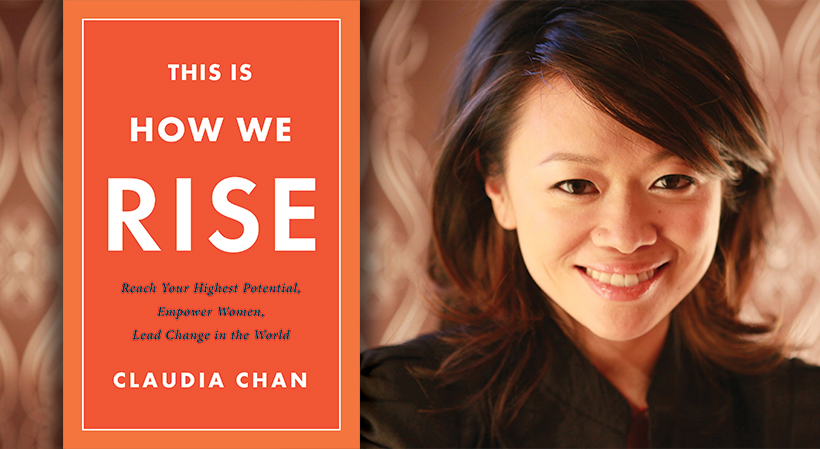The following is excerpted from “This Is How We Rise: Reach Your Highest Potential, Empower Women, Lead Change in the World” by Claudia Chan. Copyright © 2017. Available from Da Capo Lifelong Books, an imprint of Perseus Books, LLC, a subsidiary of Hachette Book Group, Inc.
In the context of purpose-driven pathways, I define an entrepreneur as someone who fulfills their purpose through leading or co-leading his or her own organization, which can be for-profit or nonprofit. Whether you’re leading a quickly growing startup, building a small to mid-size charity, or operating a freelance business of one, the same entrepreneurial skills come into play: managing a profit-and-loss statement, raising funds, hiring talent and creating demand for or participation in the product, service, brand or cause.
And if you haven’t noticed, entrepreneurship is trending, especially among millennials, 67 percent of whom say their goals involve starting their own business.
Some even call entrepreneurship the new women’s movement because women have been starting businesses at a higher rate than men for the last twenty years. And according to a 2015 report, 27 million working-age Americans have started or are running their own businesses.
Related: Founders of TheMuse.com Share the New Rules of Productivity
With an MA in public policy and a PhD in child and adolescent development, Gary Barker spent years researching issues of gender justice and became convinced that the only way to end violence and achieve equality is to engage men as “voices for change.” Gary founded Promundo in 1997, a nonprofit based in Brazil that was one of the first organizations to work directly with men and boys to promote positive masculinity and solidarity with the issues women and girls face. Now, many would not refer to Gary as an entrepreneur because his organization is a nonprofit, but I would label his pathway as entrepreneurship, or social entrepreneurship, because the skills required to build and lead Promundo were not too different from what’s needed to run a for-profit organization. Starting his own enterprise made sense for Gary because there were very few existing organizations at the time that understood the innovative approach he wanted to take toward gender equality. He applied his research knowledge and went on to raise money to build and sustain the organization through sponsors like national and local governments, aid organizations, and individuals. Now, twenty years later, Promundo has done work across continents in places like the favelas of Rio de Janeiro, the Democratic Republic of Congo, and inner cities in the United States.
Social entrepreneur is another term that can be used for the purpose-driven self-starter. Consider Geena Rocero, supermodel and founder of Gender Proud. She got her lucky break at 21 after she was discovered by a photographer, and she spent the next 12 years building a successful career as a fashion model. Then, in 2014, she gave a TED Talk titled, “Why I Must Come Out,” when she revealed her identity as a transgender woman who was born as a boy. The overwhelmingly positive response she received from the talk spurred her to create Gender Proud, an advocacy organization and production company that aims to uplift transgender communities around the world. The entrepreneurial path was the right choice for Geena because she’d already had experience as a model-entrepreneur, only this time her specific mission was to support and strengthen representations of transgender people. The organization she launched and the business model she came up with support that mission.
For me personally, the entrepreneurial path was the only way. I grew up in an entrepreneurial family, watching my parents build their restaurant businesses from scratch. My mom would say, “Claudia, to own your independence, you need to own your own business one day.” My risk aversion to entrepreneurship was also low because I saw my parents eat risk for breakfast every day. Hundreds of thousands of dollars were borrowed for each restaurant from banks and the banker friends my dad made bartending on Wall Street, and it would always take a minimum of three years to pay those funds back with interest. That was a lot of money in the 1970s to 1990s. Even more risky, when my mom’s restaurant lease was up at the Empire State Building in 1990, she began looking for another business to invest in. At the time my mom had developed a close friendship with a Greek store owner next door, Angelo, who owned several shoe-and-leather repair shops in the city. He had hit a difficult time a year back, and she lent him $200,000 to be repaid with interest. As she was seeking the next business to get into, Angelo offered her his new storefront on the lower level in the famous 666 Fifth Avenue building. Without any knowledge of leather goods repair or fixing shoes, she took on the venture. If you lived in New York City between the 1990s to 2000s during the “Sex and the City” era, when dropping a G on pair of Choos or two wasn’t out of the ordinary, you probably remember Angelo’s Shoe Repair at 666 Fifth Avenue. She not only ran that business for nine years; she also became famous as NYC’s shoe repair woman and was voted “Best Shoe and Leather Repair” in local publications like New York Magazine and the New York Post for multiple years in a row.
Sign Up: Receive the StartupNation newsletter!
Watching her and my father focus on the gain instead of the pain in business, especially during my high school and college years, motivated me to start my own business as soon as I could. My father would say, “Claudia, when you run a business, worry more about making the money than spending it.” So it’s no surprise I started my first business, iLounge, a dot-com networking event business, at 23 years old. I just focused on the “making and creating” over the spending, and that mindset spearheaded what has now been an almost twenty-year entrepreneurial path.
If you’re the kind of person who wants to move at your own bold, fast pace and build an organization according to your rules, and if you can live without the security of structure and a regular paycheck, then entrepreneurship is for you.
You might have a great idea for an innovative product or service, but unless you have an appetite for risk and a singular conviction in your own abilities, entrepreneurship is going to be a hard path. Remember: it’s not just about starting something; it’s about the long-haul commitment to building an organization. The media platform you dream of starting, the social impact app you want to launch or the sustainable fashion business you’re hoping to design may all be great ideas, but the real test is whether you’re willing to commit to eating, drinking and sleeping your venture for the next three to ten years of your life. Often this is what it takes to get something off the ground. You need to be able to live in the unknown and rely on your conviction to keep you going.
“This Is How We Rise: Reach Your Highest Potential, Empower Women, Lead Change in the World” is available now at fine booksellers and can be purchased via StartupNation.com.
Reviews of “This Is How We Rise”
“‘This Is How We Rise’ tells women how they can harness their femaleness for success.”
―New York Times
“If you’re looking to align your life and career with social impact, this book is one of the best investments you can make. A mix of inspiration, spirituality, and business strategy, Claudia provides a practical plan for how to channel your life purpose and create a more equal world for women and men.”
―Sallie Krawcheck, CEO and cofounder of Ellevest, chair of Ellevate Network, and author of “Own It”
“Equality is essential to the future success of humanity; it is not something to be feared or threatened by, but rather a standard to empower us all to live life to the fullest. Claudia Chan has been one of the most dedicated and inspiring voices calling on all people to work together for this basic human right.”
―Nigel Barker, photographer, filmmaker, and New York Times best-selling author
“‘This Is How We Rise’ challenges the core of the ‘me’ mentality and proposes a ‘we’ movement. In football, we say football, family, and faith to promote success by playing for something bigger than the individual. Claudia masterfully crafts this philosophy into a strategy for empowering women and kickstarting movements. Together, we can all rise. For the love of progress, read this book today.”
―Dr. Jen Welter, first female coach in the NFL






